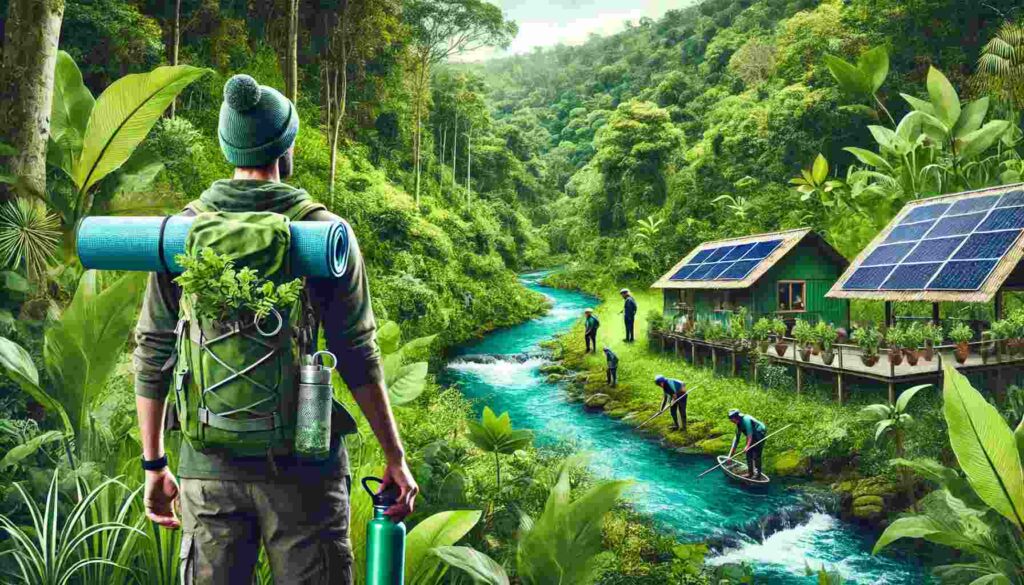As awareness of environmental issues continues to rise, more people seek ways to travel while minimizing their impact on the planet. Eco-conscious travel doesn’t mean sacrificing comfort or adventure; it’s about making thoughtful choices that benefit the environment and local communities. In 2025, you can follow plenty of sustainable practices to enjoy a fulfilling and responsible travel experience.
Today, we will offer a guide on how to become an environmentally responsible traveler by 2025. This guide will cover everything from traveling responsibly on the road, in the air, and at sea to finding green accommodations and dining choices to interacting with cultures and destinations.
Eco-Friendly Travel Is Important
Tourism is responsible for almost 8% of the world’s emissions of greenhouse gases. From the minute we set foot on an airplane to the waste we abandon in hotel rooms, travel, if not done consciously, is harmful to the environment. Eco-tourism focuses on realizing and mitigating these impacts via sustainable transport and accommodation or participating in local experiences that support communities.

Make Sustainable Transportation Choices
The prime source of carbon emissions in the travel industry is Transportation. How to World Travel with Low Carbon Emissions
Travel by Train or Bus Instead of Flying
However, air travel is a significant contributor to greenhouse gas emissions. If you travel shorter distances, taking a train or bus with a significantly lower carbon footprint is possible. According To My Experience, Trains Are Very Well Organized In Areas Like Europe and Asia where high-speed rail is Easily Accessible.
Choose Direct Flights and Offset Your Carbon Emissions
If you must fly, consider direct flights. More fuel is consumed during multiple takeoffs and landings. Most airlines already have programs where you can offset your flying carbon emissions by donating to various projects, including tree-planting and fossil-fuel replacements.
Use Electric Vehicles (EVs) or Carpooling
Choose an electric vehicle (EV) if you need a car for your trip which emits zero emissions. Record-breaking electric vehicle sales may also open the way for a higher share of EVs in countries like Sweden (Image: Nissan). If you can’t find an electric car, reduce traffic by carpooling or ride-sharing
Stay at Sustainable Accommodations
The place you decide to stay can directly impact your carbon footprint. Choose places that are dedicated to sustainability and conscious tourism.
Choose Eco-Certified Hotels
Sustainability is seen in many hotels today. Opt for one certified by green organizations such as Green Globe, LEED, or EarthCheck. These hotels use renewable energy, recycle waste, and maintain water, among other things, and benefit local communities.
Stay in Locally-Owned Guesthouses or Eco-Lodges
Instead of your typical central chain hotel, look at the smaller guesthouses and eco-lodges that are generally independently owned. These communities will probably have a higher volume of locally sourced goods and food, be more inclined to employ residents as workers for that location, and emphasize ensuring that the area around them is protected.
Consider Sustainable Camping or Glamping
You can also book an eco-friendly campsite for a camping or glamping (luxury camping ) experience closer to nature. Most have implemented strict guidelines for waste management, energy usage, and water conservation.

Reduce Waste While Traveling
Being a sustainable traveler also includes wasting less. A lot of plastic waste arrives at travel destinations, and this can easily be avoided.
Bring Reusable Items
Reusing water bottles, coffee cups, utensils, and shopping bags can help reduce significant amounts of single-use plastic waste. They don’t take up much space and can be used during your journey.
Avoid Hotel Single-Use Toiletries
Many hotels provide disposable toiletries that produce more waste than necessary. Opt for plastic-free toiletries in durable containers instead. Many brands now offer solid shampoos, soaps, and lotions to avoid plastic packaging.
Opt for Digital Boarding Passes and Tickets
Use the digital options on your devices to avoid paper tickets and boarding passes! Many airlines and transport services allow you to check in online, and paper tickets are a thing of the past.

Support Local and Sustainable Businesses
Support small economies and businesses by being eco-conscious when traveling. Choose more respectful places to put your money.
Eat Local, Organic, and Plant-Based
Opt for quick, local (or at least regional), and sustainable restaurants when eating somewhere. This is also easy on nature, as animal husbandry and dairy farming require a lot of resources.
Shop at Local Markets
And forget about spending a fortune on souvenirs like you would in some of those large tourist shops. Instead, check out the local markets, where many handicraft products are offered. This will also decrease the carbon footprint and, in turn, help local artisans and traditional crafts.
Choose Responsible Tour Operators
Only book tours or activities if they are operated as responsible tourism practices. Search for certifications such as the GSTC or information about companies that work with local communities to back up your trip.
Respect the Local Environment and Culture
Green travel is all about minimizing your carbon footprint and acknowledging the places you go to.
Follow Leave No Trace Principles
When hiking or exploring natural areas, practice “Leave No Trace.” That means collecting all your garbage, sticking to trails, and not harming any local fauna or flora.
Be Mindful of Water and Energy Usage
Water and electricity are rare luxuries in much of the world. Take shorter showers, turn off lights when they are not being used, use shared laundry services less often, and try to watch your energy consumption.
Respect Local Customs and Cultures
Respect for the local customs and traditions is also a part of responsible travel. Learn a few key phrases in the local language, respect and follow etiquette rules as much as possible, and ensure your attire respects whichever region you visit.

Neutralize the carbon footprint of your trip
You can try as hard as you like to reduce your travel emissions, but there will always be a level of CO2 that cannot be avoided. This is where climate offset programs can help. Through these programs, investment is made in ecological projects that either capture or prevent the release of carbon dioxide. It allows you to calculate your trip’s carbon footprint and then contribute to a project that means something to you.
Sites like Cool Effect and MyClimate offer calculators to determine your carbon footprint and allow you to contribute with offset methods like forest restoration or renewable energy projects.
Choose Off-the-Beaten-Path Destinations
The rise of over-tourism has plagued popular tourist destinations globally, creating crowding and environmental deterioration while depleting local resources. Travel to less popular or “off-the-path” destinations, and you can help take the torrid off those areas AND have a more unique and fulfilling travel experience.
Avoid Overcrowded Tourist Hotspots
The needs of mass tourism can take a heavy toll on iconic landmarks and fragile ecosystems. I recommend skipping the over-commercialized and environmentally destroyed resorts and opting for a more secret location. Even interacting with local cultures in a very different, and most likely more authentic, way against the backdrop of regional diversity helps!
Visit During the Off-Season
Traveling during the off-season will also help decrease your environmental footprint. If people avoid peak travel times, overcrowding can be reduced by using less water and energy. Getting to a destination in the off-season can also help you avoid the crowds and save you some money.
Engage in Voluntourism and Give Back
Voluntourism is another way to make the most out of your eco-friendly travels. An important caveat is that participants should select programs with a reputable record of enhancing local communities and the environment rather than ones designed strictly for profit.
Choose Ethical Voluntourism Programs
When volunteering abroad (such as with a voluntourism program), ensure that the program is ethical and long-term beneficial to the community or environment before you go. Ask organizations about their practices and ensure you agree to a substance.
Support Local Community Projects
Volunteering for a local project can also give back to the communities you visit. Teaching English, assisting with conservation projects, or participating in beach cleanups are ways to enrich your travel experience and leave beneficial impacts.

Pack Light and Smart
Packing better makes travel more accessible and reduces environmental impact. Baggage is also yellow, meaning a plane, bus, or car consumes more fuel. People who practice light packing are more likely to prioritize purchasing what they need and subsequently make an effort to refuse single-use or disposable items.
Bring Multipurpose Items
Select clothing that serves more than one purpose on your trip. Minimize what you bring. For example, a scarf that is also a blanket or an iPhone that is your camera, GPS, and guidebook.
Choose Eco-Friendly Travel Gear
Choose as much sustainable and eco-friendly travel gear as you can. This could be by choosing baggage made from recycled materials, using a solar charger, or using environmentally friendly toiletries. Tiny, incremental changes in your travel gear can go a long way for the environment and to save waste.
Educate Yourself on Environmental and Cultural Awareness
Learning is a crucial aspect of living an eco-friendly traveling lifestyle! Consulting each destination you intend to visit may be a lot of work, but the more you learn about where you are going, the more responsible decisions you can make.
Learn About the Environmental Issues of Your Destination
Each location has different environmental struggles to contend with. Spend time understanding the ecological issues of where you are about to go. Consider the extinction of wild animals, lack of water, and tourism’s impact on the environmental system. Education can empower you to understand your role in all of this better, and the more conscious we are about our actions, the easier it is to make decisions that contribute to conservation.
If you visit the Galápagos, understand the fragile balance of the ecosystem and the regulations to protect it. The local laws include bans on interacting with wildlife and guidelines for waste disposal on the island.
Honor Local Cultures and Traditions
Besides environmental consciousness, cultural awareness is essential as well. Recognizing and honoring the local customs, traditions, and ways of living is necessary for cultural conservation and prevents cultural alienation. Traveling should not be stereotype-conforming. Traveling to new places is appreciating diversity and engaging with your body language in a non-deceptible yet meaningful manner.

Spread the Word: Inspire Others to Travel Responsibly
Any efforts to educate people on the importance of being more responsible in their travels are a step towards eco-conscious travel. Encourage your friends, family, and social media followers to travel sustainably. By sharing stories of your adventures (and misadventures), you can inspire others to be mindful travelers and to think about the impact that they could have when traveling.
Share Your Ways of Eco-Friendly Travel
For those flying to get out of town during Milan Fashion Week (wink, a girl has got to eat), social media allows people like us to share tips and experiences for eco-conscious travel. You can inspire people to follow in your footsteps by showcasing eco-friendly accommodations, sharing your expertise using sustainable travel gear, or even documenting how much effort you have put into reducing waste.
Conclusion
Traveling in 2025 is about making mindful decisions that benefit both the planet and the people. You can explore the world while minimizing your impact by choosing eco-friendly transportation, staying in sustainable accommodations, reducing waste, supporting local businesses, respecting the environment and culture, and offsetting carbon emissions.


